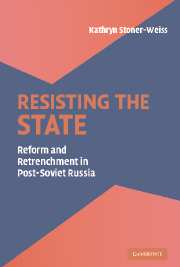Book contents
- Frontmatter
- Contents
- Acknowledgments
- Note on Transliteration
- Resisting the State
- 1 W(h)ither the Russian State?
- 2 Apparatchiki into “Entrepreneurchiki”: The Sources of Russia's Weak Central State
- 3 Governing Russia: Patterns of Regional Resistance to the Central State
- 4 Inside the Russian State: Assessing Infrastructural Power in the Provinces
- 5 Retrenchment over Reform: Obstacles to the Central State in the Periphery
- 6 Weak National Parties, Weak Central State
- 7 The Comparative Implications of Russia's Weak State Syndrome
- Index
4 - Inside the Russian State: Assessing Infrastructural Power in the Provinces
Published online by Cambridge University Press: 25 July 2009
- Frontmatter
- Contents
- Acknowledgments
- Note on Transliteration
- Resisting the State
- 1 W(h)ither the Russian State?
- 2 Apparatchiki into “Entrepreneurchiki”: The Sources of Russia's Weak Central State
- 3 Governing Russia: Patterns of Regional Resistance to the Central State
- 4 Inside the Russian State: Assessing Infrastructural Power in the Provinces
- 5 Retrenchment over Reform: Obstacles to the Central State in the Periphery
- 6 Weak National Parties, Weak Central State
- 7 The Comparative Implications of Russia's Weak State Syndrome
- Index
Summary
As I noted in Chapter 1, the central state's capacity to implement its programs and policies can be measured in a variety of ways. Where Chapter 3 used a data set derived from Russian media reports of regional noncompliance with federal law and the constitution in order to discern patterns across time, policy area, and region, this chapter explores in greater detail the patterns of relative central state infrastructural or administrative capacity in the regions. For despite all of the evidence in the preceding chapter of regional threats to central state capacity through noncompliance with federal law and the constitution, it is possible that regional politicians may have passed legislation that presented a serious challenge to central state capacity only to make a political point, but their policymaking and policy implementation activities tended to basically abide by federal norms nonetheless. If this were true, then simply citing examples of widespread legal noncompliance with federal power would mask the reality of federal control over Russian public administration in the regions.
One method of addressing this possibility is to actually ask public officials in the periphery about how policy was made and implemented concretely, and what influenced both of these processes in the 1990s. This chapter, therefore, evaluates the concrete power balance between the central state and the periphery through interviews with 824 public officials in 72 of Russia's 89 provinces. Local teams of Russian interviewers conducted face-to-face interviews between September 30 and November 30, 1999.
- Type
- Chapter
- Information
- Resisting the StateReform and Retrenchment in Post-Soviet Russia, pp. 77 - 97Publisher: Cambridge University PressPrint publication year: 2006
- 1
- Cited by



